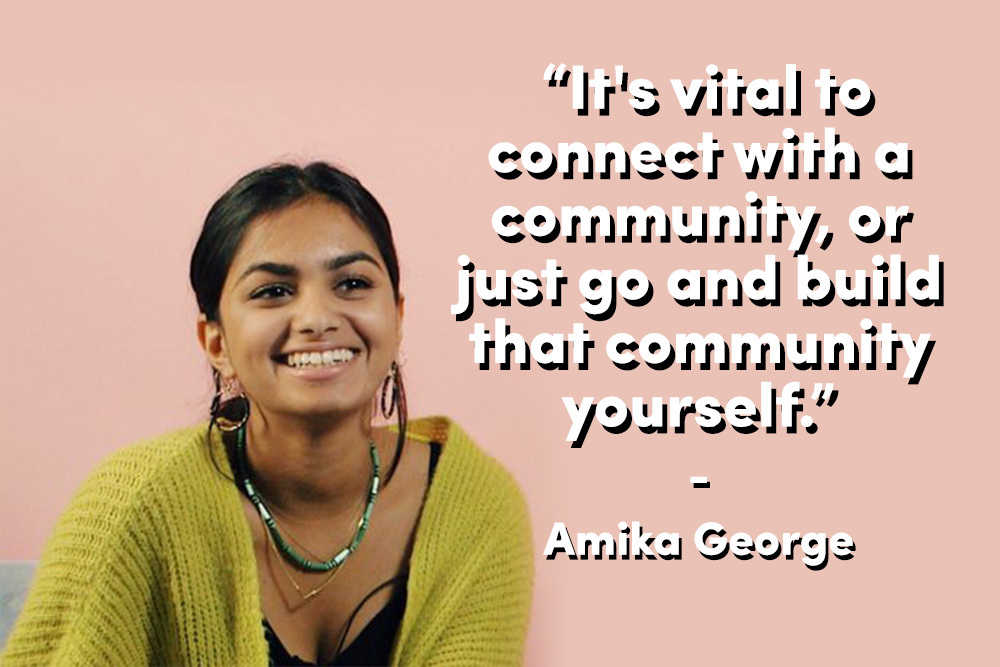We Talk To Student Activist Amika George About Period Poverty And The FreePeriods Movement
Celebrating her success and talking about the future.
If you don’t know the name Amika George, get to know it. The 19-year old activist’s tireless #FreePeriods campaign has just ensured all school-aged girls get access to free menstrual products by 2020.
From hiding tampons up your sleeve to the universally-acknowledged metaphors used to avoid mentioning the p-word in public, it’s safe to say that periods are one of the last remaining taboos here in the UK. While, as adults, we can often laugh off the acknowledged ridiculousness of such situations, the consequences are far more dire for young school-aged girls.
A recent study from Plan International UK found that one in seven girls have been unable to afford sanitary wear, while more than one in ten have had to improvise with such products due to lack of money. This period poverty forces many girls to skip school and miss out on vital education. Nikki Giant, the UK Girls' Rights Strategy and Development Manager of the charity told us:
“It’s unacceptable that women and girls are suffering because they don’t have enough money to manage their period. Our research shows that 40 percent of girls have been forced to rely on toilet roll at some point because they’ve struggled to afford period products.”
This was something the then 17-year old student, Amika George, just couldn’t sit by and watch. And she didn’t. Forming FreePeriods in 2017, a campaign group which would fight to tackle period injustices in England (and later, much further afield), Amika began lobbying for free menstrual products in schools. Similarly, the acknowledgment, as Giant explains, that, “free products won’t solve things if girls are too embarrassed to talk about their periods or don’t understand how their bodies work,” lead Amika to also focus her efforts on decreasing the stigma surrounding periods for young people.
On April 16, Amika’s tireless efforts were rewarded when the Department of Education announced they would be introducing a scheme for free menstrual products for all school-aged children in England - including those in primary education. While students will have to wait until next year for access to the free products, this promise is an incredible step towards eradicating period poverty in the UK and is integral to ensuring all girls are given the opportunity to reach their true potential.
Between studying for exams at Oxford University and planning upcoming projects for FreePeriods (no, she’s not stopping, despite her recent success), the inspiring activist found time to answer some of our burning questions.
Congrats on the news! So, why is period poverty such an important issue for you?
Amika: This is such an important issue for me because I have always been able to go to school without worrying about my periods, and I never had to stress about where my next pad was going to come from. I knew how stressed I'd get if I was ill with flu and couldn't go to school. I'd have missed so much school and would have a huge amount to catch up on. The thought of missing school regularly just because girls were too poor to manage their periods, seemed to be disgustingly unfair, and I was appalled that the government hadn't taken any action.
"The government's inaction made me realize that unless we all tried to enact some change, these children who were suffering from period poverty would be ignored."
And how did you first get involved with period activism?
Amika: I started FreePeriods because of anger. The government's inaction made me realize that unless we all tried to enact some change, these children who were suffering from period poverty would be ignored. It just wasn't fair, and I felt I should try and lobby the government to provide free menstrual products in schools. I started the FreePeriods petition which currently has over 280k signatures and began raising awareness of period poverty, writing articles, giving interviews, contacting MPs, and all the political parties, until every one of the main political parties pledged to end period poverty in their 2017 manifestos. All except our government, but after two years, in the spring statement, the Chancellor pledged to give funding for all schools to provide free menstrual products for whoever needs them. This was the news I'd wanted to hear, and I'm so thrilled.

What does your day to day life consist of when planning a campaign?
Amika: It consists of getting as much awareness of the campaign as possible. So much of it was made up of late nights writing articles for newspapers and devising ways to get the words 'period poverty' in as many mainstream publications as possible. When I started FreePeriods, I was 17 and still at school, so it was quite a balancing act getting homework and exams done, while emailing MPs, going to Parliament, giving talks and interviews. The school was great, and really understanding especially when I had to rush off for an interview. Meeting likeminded people, who also felt strongly about period poverty was also really important. It's vital to connect with a community, or just go and build that community yourself. It's really important to have a plan when you're taking on a big campaign and trust me when I say you need a huge amount of resilience!
"I knew it was necessary to make sure that no child has to miss out on their education."
How did you feel when you heard the recent plans for period products to become available to primary school-aged children?
Amika: I was beyond thrilled. When the announcement came about secondary schools and colleges, it was incredible, but I knew that we would need the pledge extended to primaries too, to make sure that no child would have to miss school. Ensuring access to period products for every child in compulsory education was the goal, so the initial pledge felt incomplete. We did whatever we could to persuade the Government to extend the funding to all schools. We met with them and explained to them how vital it was because children can start their periods at a very young age - I was still at primary school when I started mine, as were most of my friends. So, I knew it was necessary to make sure that no child has to miss out on their education. Finally, the government agreed and that was a real victory. I was elated!
What are your plans for the future regarding tackling period poverty and the stigma surrounding periods?
Amika: What’s next for the campaign? I will continue to use my voice to talk about periods and try and change the language used about menstruation so it’s more empowering and positive. Periods should never be something we hideaway, and we need to talk about them in a totally different tone. I know that change is happening, and it’s brilliant to see that young girls, especially, are refusing to be ashamed.
Artwork by: ALICIA SKINNER
Next up, Let’s End The Taboo, End The Shame And Talk About Periods












